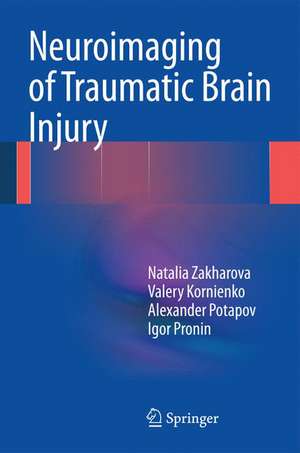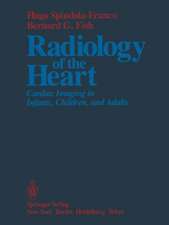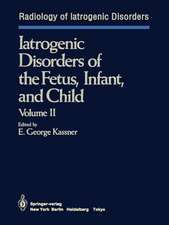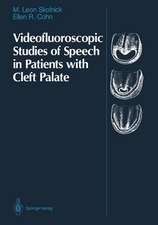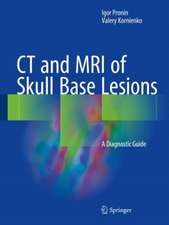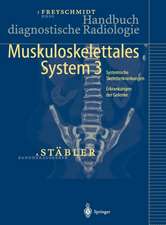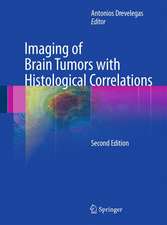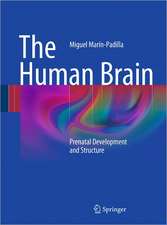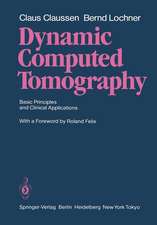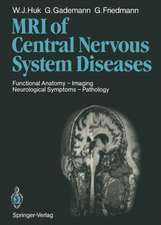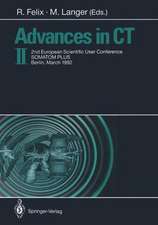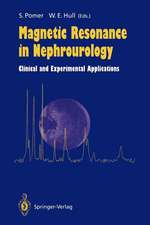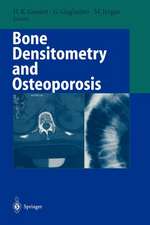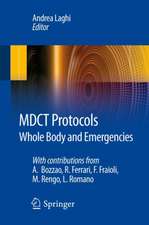Neuroimaging of Traumatic Brain Injury
Autor Natalia Zakharova, Valery Kornienko, Alexander Potapov, Igor Proninen Limba Engleză Hardback – 2 apr 2014
| Toate formatele și edițiile | Preț | Express |
|---|---|---|
| Paperback (1) | 330.31 lei 38-44 zile | |
| Springer International Publishing – 23 aug 2016 | 330.31 lei 38-44 zile | |
| Hardback (1) | 371.10 lei 6-8 săpt. | |
| Springer International Publishing – 2 apr 2014 | 371.10 lei 6-8 săpt. |
Preț: 371.10 lei
Preț vechi: 390.63 lei
-5% Nou
Puncte Express: 557
Preț estimativ în valută:
71.02€ • 73.87$ • 58.63£
71.02€ • 73.87$ • 58.63£
Carte tipărită la comandă
Livrare economică 14-28 aprilie
Preluare comenzi: 021 569.72.76
Specificații
ISBN-13: 9783319043548
ISBN-10: 3319043544
Pagini: 250
Ilustrații: XII, 159 p. 67 illus., 53 illus. in color.
Dimensiuni: 155 x 235 x 13 mm
Greutate: 0.48 kg
Ediția:2014
Editura: Springer International Publishing
Colecția Springer
Locul publicării:Cham, Switzerland
ISBN-10: 3319043544
Pagini: 250
Ilustrații: XII, 159 p. 67 illus., 53 illus. in color.
Dimensiuni: 155 x 235 x 13 mm
Greutate: 0.48 kg
Ediția:2014
Editura: Springer International Publishing
Colecția Springer
Locul publicării:Cham, Switzerland
Public țintă
Professional/practitionerCuprins
Clinical and prognostic value of neuroimaging in traumatic brain injury.- Clinical evaluation and neuroimaging technologies.- Neuroimaging classification of traumatic brain injury.- Dynamic study of white matter fiber tracts after traumatic brain injury.- Mapping of cerebral blood flow in focal and diffuse brain injury.- Dynamics of hemispheric and brain stem cerebral blood flow.- Conclusion.
Recenzii
From the book reviews:
“The book would be of interest to those pursuing advanced training in neuroimaging, such as fellows of neuroradiology. … The images, particularly of MRI tractography of corticospinal tracts and those of CT perfusion studies are particularly useful. … The discussion of various forms of MRI imaging in the evaluation of traumatic brain injury … and the newly proposed classification of brain injuries with MRI, should prove particularly useful for those interested in this field of study.” (Bennett S. Greenspan, Doody’s Book Reviews, August, 2014)
“The book would be of interest to those pursuing advanced training in neuroimaging, such as fellows of neuroradiology. … The images, particularly of MRI tractography of corticospinal tracts and those of CT perfusion studies are particularly useful. … The discussion of various forms of MRI imaging in the evaluation of traumatic brain injury … and the newly proposed classification of brain injuries with MRI, should prove particularly useful for those interested in this field of study.” (Bennett S. Greenspan, Doody’s Book Reviews, August, 2014)
Textul de pe ultima copertă
The main purpose of this book is to present emerging neuroimaging data in order to define the role of primary and secondary structural and hemodynamic disturbances in different phases of traumatic brain injury (TBI) and to analyze the potential of diffusion tensor MRI, tractography and CT perfusion imaging in evaluating the dynamics of TBI. The authors present a new MRI classification of brain stem and hemispheric cortical/subcortical damage localization that is of significant prognostic value. New data are provided regarding the pathogenesis and dynamics of diffuse and focal brain injuries and qualitative and quantitative changes in the brain white matter tracts. It is shown that diffuse axonal injury can be considered a clinical model of multidimensional “split brain” with commissural, association and projection fiber disorders. The book will be of interest for neuroradiologists, neurosurgeons, neurologists and others with an interest in the subject.
Caracteristici
Presents novel neuroimaging data elucidating the role of structural and physiological disturbances in different phases of traumatic brain injury (TBI) Analyzes the potential of diffusion tensor MRI, tractography and CT perfusion imaging in evaluating the dynamics of TBI Presents a new MRI classification of prognostic significance
